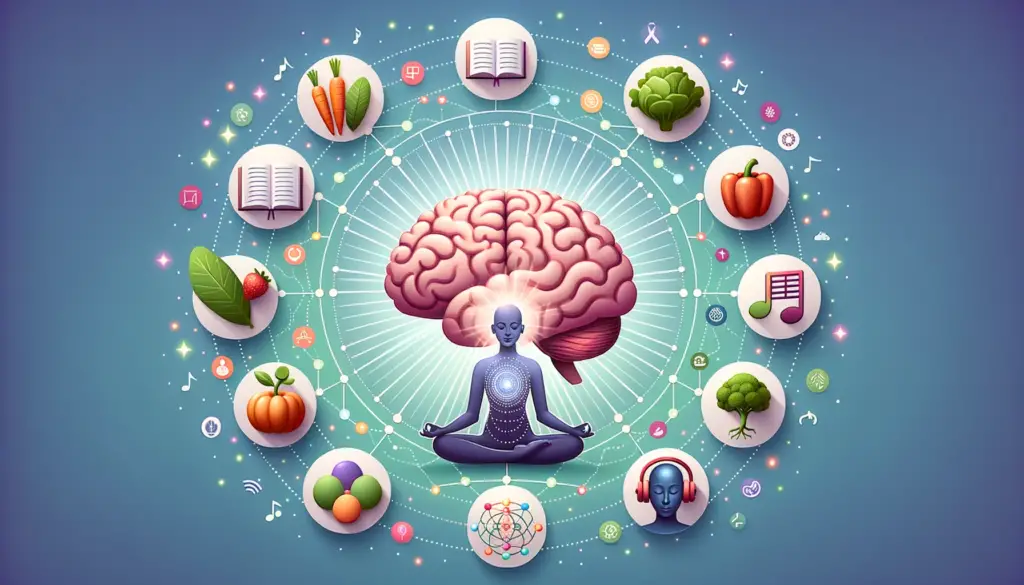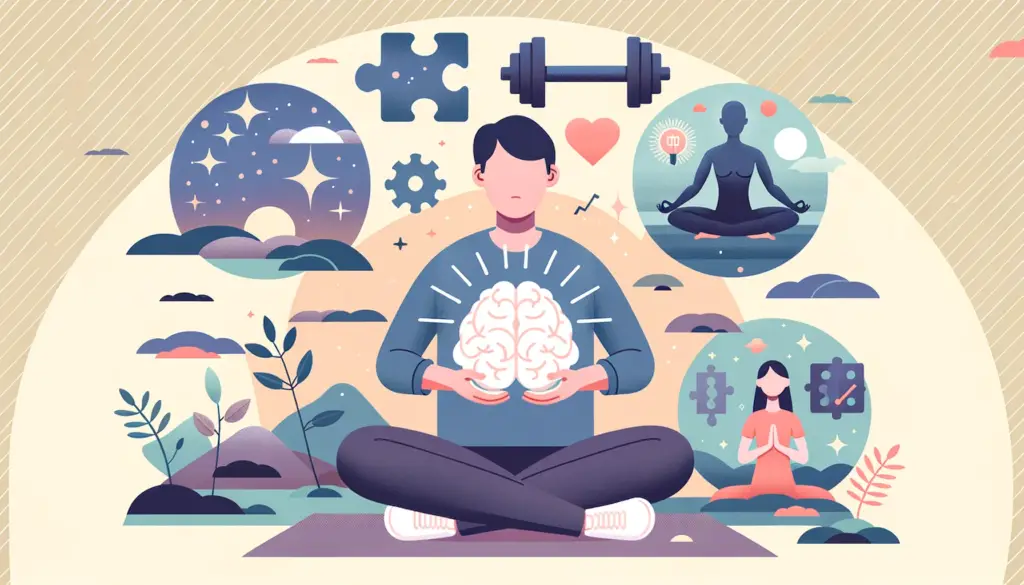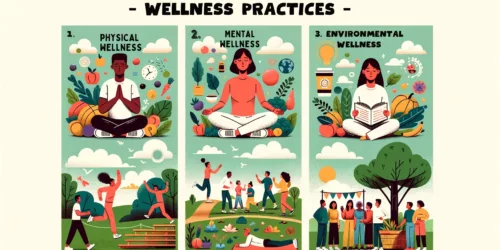Wellness Practices for Enhanced Brain Function

Are you looking for ways to sharpen your focus and increase your cognitive clarity? If so, we have the perfect resources for you!
Our comprehensive guide will help you develop a holistic approach to wellness practices that can enhance brain function. From diet and exercise to meditation and time management, learn how these simple strategies can help optimize your mental health.
Join us as we explore ways to maximize your cognitive capabilities!
Key Takeaways
- Exercise regularly to improve brain health and cognitive abilities.
- Eat a nutrient-rich diet, including dark leafy greens, nuts and seeds, and citrus fruits, to optimize brain nutrition.
- Consider taking antioxidant supplements with organic herbs and minerals to boost overall health and cognitive abilities.
- Stay hydrated by carrying a reusable water bottle and incorporating naturally hydrating foods into your diet for enhanced brain function.
Exercise for Cognitive Clarity
Exercise can help improve cognitive clarity. Many studies have shown exercise to be beneficial for brain health and longevity. From physical challenges such as running, swimming, or biking, to mental exercises like puzzles or games, all types of exercise are useful in improving the functionality of the brain.
Aerobic activities increase blood flow to the brain and strengthen neural connections that lead to better concentration and memory recall. Mental exercises improve problem-solving skills and enhance creativity. Furthermore, regular exercise helps reduce stress levels which further contributes to improved cognitive clarity.
Diet for Brain Health
We are here to discuss the importance of diet for brain health.
Eating nutrient-rich foods, taking antioxidant supplements, and developing healthy hydration habits are all important factors for maintaining a healthy mind.
Nutrient-Rich Foods
You’ve likely heard that eating nutrient-rich foods can help enhance brain function. To maintain dietary balance and optimize brain nutrition, it’s essential to consume a variety of wholesome foods packed with beneficial vitamins, minerals, and other nutrients.
These include:
- Dark leafy greens like spinach and kale
- Nuts and seeds like almonds or sunflower seeds
- Citrus fruits such as oranges or grapefruit
Consuming these types of nutrient-dense foods regularly will provide your body—and your brain—with the right fuel for optimal performance.
With this foundation in place, you can then consider adding antioxidant supplements to further strengthen your wellness practices for enhanced brain function.
Antioxidant Supplements
We all know that eating nutrient-rich foods is key to maintaining overall health and boosting cognitive abilities. But did you know that antioxidant supplements can help even further?
Antioxidant supplements can help to further boost overall health and support cognitive abilities. Taking the right antioxidants in the form of a supplement can improve absorption of these vital nutrients while also providing protection against cognitive fatigue. This helps to ensure our brains are functioning optimally and gives us an edge when it comes to focus, memory, learning skills, and problem-solving.
When choosing a supplement, look for one packed with organic herbs and minerals like green tea extract, resveratrol, or grape seed extract, to name a few.
With regular use of antioxidant supplements, you’ll be on your way to enhanced brain function in no time!
Hydration Habits
Staying hydrated is essential for your overall health and cognitive abilities, so make sure to drink plenty of fluids throughout the day. To ensure optimal hydration habits:
- Plan ahead by carrying a reusable water bottle with you so that you always have access to fluids.
- Be mindful when drinking water. Pay attention to how much and how often you’re consuming fluids, and adjust accordingly.
- Incorporate mindful eating into your routine as well; some foods are naturally hydrating and can help contribute towards proper fluid intake.
It’s important to be aware of the amount of fluid we take in on a daily basis since it affects our overall wellbeing. By being intentional about our hydration habits, we can ensure that we get the proper amount of liquids each day for enhanced brain function!
Meditation for Stress Management

We all experience stress in our daily lives, but meditating regularly can help you manage it. By creating a mind-body connection and allowing for cognitive relaxation, meditation has been scientifically proven to reduce stress and anxiety. It can also help with improving focus, clarity of thought, creativity, sleep quality and overall well-being.
To get started with meditation for stress management, begin by setting aside 10 minutes each day. Find a comfortable place where you won’t be disturbed and start by sitting still with your eyes closed. Focus on your breathing as you inhale and exhale slowly until you reach a peaceful state of being. With practice, it will become easier to go deeper into the meditative state while managing distractions more effectively.
Meditation is a simple yet powerful way to improve your mental health and physical well-being. Start small but be consistent; it takes time before you will feel the full effects of this practice on your life!
Sleep for Mental Restoration
Getting enough quality sleep is essential for restoring mental energy and balance. Practicing good sleep hygiene, such as avoiding screens before bedtime and sticking to a regular sleep schedule, can help ensure restful, restorative sleep.
Additionally, utilizing deep breathing exercises can help relax the body and mind into a state of restfulness. Exposure to natural light during the day helps regulate circadian rhythms. Keeping the bedroom dark, cool, and quiet can also encourage better sleep.
Social Connections for Emotional Wellbeing
Maintaining strong social connections provides emotional support and can positively impact overall health. Building positive relationships with family, friends, and colleagues can help us to feel supported, appreciated, and understood. This in turn leads to better mental wellness by reducing stress levels, improving self-esteem, and providing an outlet for communication.
| Benefits | Examples | Outcomes |
|---|---|---|
| Reduce Stress | Spend time with supportive people; participate in activities you enjoy with others; talk openly about your feelings | Feel calmer and less overwhelmed |
| Improve Self-Esteem | Connect with those who accept you without judgement; engage in meaningful conversations; take pride in personal accomplishments | Increased self-confidence & improved moods |
| Communication Outlet | Share experiences with people who understand & listen without judgement; collaborate on projects/activities together | Improved understanding of oneself & others |
Mental Stimulation for Cognitive Development
Engaging in mental stimulation activities can help you develop cognitive skills and boost your overall wellbeing. Here are some ways to get started:
- Participate in interactive learning experiences such as online courses, tutorials, or workshops. These activities can help you gain new knowledge and challenge your brain in various ways.
- Practice brain exercises like puzzles, crosswords, or memory games. Doing so will give your mind a workout while also providing fun and relaxation at the same time.
- Engage in conversations with friends, family, or acquaintances about topics of interest or debate points that require critical thinking. This kind of interaction encourages creative problem-solving and keeps the brain active.
Minimizing Toxic Exposure for Cognitive Protection
Protecting your cognitive health starts with minimizing toxic exposures in your environment. From air, water and soil pollution to chemical exposure from everyday products, toxins can be found everywhere. To protect our brains from such damage, it’s important to take steps to reduce our exposure.
| Source | Toxins | Prevention |
|---|---|---|
| Air | Particulate matter | Avoid urban areas; use air filters at home. |
| Water | Heavy metals | Use filtered water; avoid consuming contaminated fish or shellfish. |
| Soil | Pesticides | Grow organic produce; wash all fruits and vegetables before eating them. |
| Products | Volatile Organic Compounds (VOCs) | Choose natural products whenever possible; open windows for fresh air circulation when using these products indoors. |
Time Management for Optimal Performance
Managing your time effectively is key for achieving optimal performance. To maximize cognitive function, try these three tips:
- Time Blocking – Devote specific times to focus on particular tasks or activities. For example, dedicate the first hour of each day to planning out and organizing for upcoming events.
- Goal Setting – Set realistic goals that are attainable within a certain timeframe. This way, you can track progress and stay motivated.
- Prioritization – Establish what needs to be done right now and what can wait until later. Make a list of the most important tasks that need immediate attention and work from there.
Self-Care for Mental Resilience
We, as a society, need to focus on mental awareness and resilience. To do so, we should emphasize the importance of stress management and mindful habits in our daily lives.
Taking care of our minds is just as important as taking care of our bodies. Engaging in activities that reduce stress and promote better self-care will help us develop better mental resilience.
Mental Awareness
Becoming more aware of mental health is a key component of maintaining healthy brain function. Practicing mindfulness activities, organizing time effectively, and seeking professional help are essential steps towards achieving mental wellness.
Mindfulness activities such as meditation, yoga, and journaling can be beneficial in reducing stress and increasing focus.
Time organization involves creating daily routines that prioritize self-care and foster healthy habits.
Seeking professional help is an important step to getting the support needed for full recovery from any form of mental illness or distress.
Taking these steps will allow us to become more mindful and aware of our own mental health needs while also taking action to ensure we are caring for ourselves in meaningful ways.
Stress Management
Taking action to manage stress is essential for your mental health and wellbeing. To help, there are many soothing techniques and cognitive skills available.
| Technique | Cognitive Skill |
|---|---|
| Meditation | Reframing |
| Yoga | Thought Stopping |
| Self-Massage | Journaling |
These activities can help reduce feelings of stress while also improving cognitive functions such as problem solving and creativity. With a mindful approach, you can develop habits that will help cope with life’s challenges in a healthy way. Now let’s move on to discussing mindful habits for enhanced brain function.
Mindful Habits
Developing mindful habits can help us better cope with life’s stresses and improve our mental health. We should strive to incorporate mindful practices into our daily lives. These practices include mindful eating, which encourages us to be conscious of the food we consume and how it makes us feel physically and emotionally. Mindful living involves becoming more aware of our actions and challenging negative thoughts, while also being kinder to ourselves. Engaging in mindfulness meditation can help reduce stress levels and free up mental resources for enhanced brain function. By taking part in these mindful practices, we can work towards achieving greater inner peace and wellbeing.
Next, let’s look at how positive thinking can contribute to increased mental strength!
Positive Thinking for Mental Strength
Fostering positive thinking can help you build mental strength. Developing a positive outlook and engaging in self-talk are essential components of this practice.
By having an optimistic point of view, we can better recognize our own strengths and achieve success even when faced with adversity. Additionally, speaking kindly to ourselves helps us stay grounded and manage life’s challenges more effectively.
To start developing these habits, begin by recognizing negative thoughts or emotions when they arise and replace them with positive affirmations. It takes time to retrain the brain, but eventually these healthy practices become second nature for improved mental well being.
Frequently Asked Questions
How Much Exercise Is Necessary for Cognitive Clarity?
We believe regular exercise, mental stimulation, and mindful breathing are essential to attaining cognitive clarity. Practicing these in a balanced manner can help us stay focused and alert.
What Are the Best Foods to Eat for Optimal Brain Health?
We strive for mindful eating and brain-boosting foods to optimize our cognitive health. Fruits, vegetables, whole grains, healthy fats, and lean proteins can all contribute to better brain functioning.
How Long Should I Meditate for Maximum Stress Management?
We recommend meditating for at least 10 minutes per day. To maximize stress management, be mindful while meditating and incorporate deep breathing techniques. Doing this regularly will help you achieve a more relaxed state of mind and improved brain function.
What Is the Ideal Amount of Sleep for Mental Restoration?
We all need restorative naps and plenty of sleep to restore our mental discipline. Aim for 8 hours of quality sleep per night for best results.
How Often Should I Socialize to Improve Emotional Wellbeing?
We should aim to talk to friends and connect with family regularly to improve emotional wellbeing. Connecting with others is an important part of self-care that can boost our moods and help us feel supported.
Conclusion
We’ve discussed a range of wellness practices that can help boost brain function, and now it’s up to you to put them into practice!
We’ve learned that exercise, diet, meditation, sleep, social connections, and minimizing toxic exposure are all essential for optimal cognitive performance.
It’s also important to manage your time wisely and take care of yourself with positive thinking.
So let’s get out there and supercharge our brains – after all, it’s never too late to start living our best mental lives!






